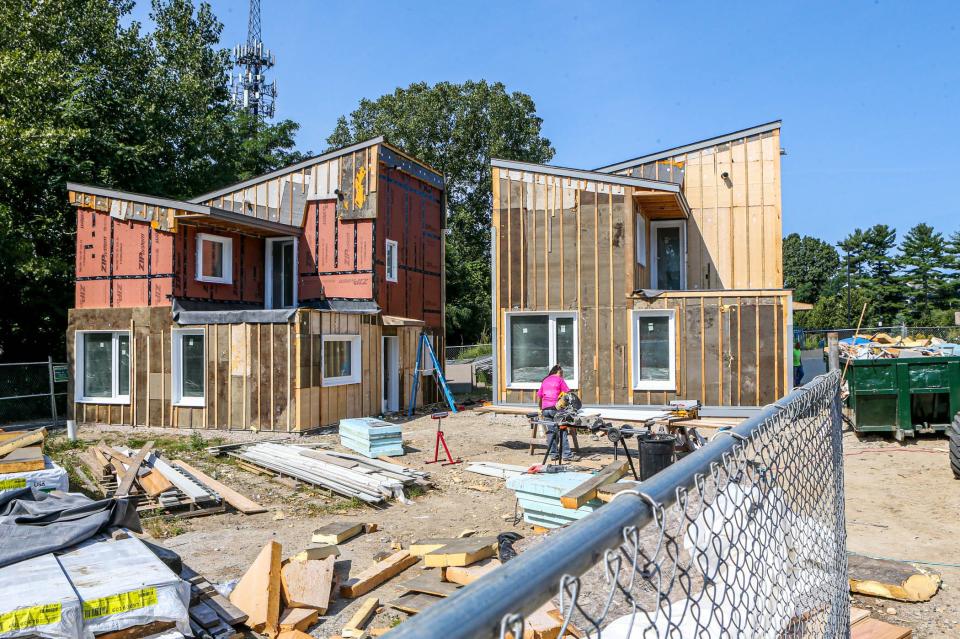How RI's state housing agency plans to build more housing in 2024
Rhode Island's new state housing agency is asking for more ammunition in the battle for home affordability, including what would be the largest housing bond in state history and a new tax on short-term vacation rentals.
Housing Secretary Stefan Pryor outlined a swath of funding requests to Gov. Dan McKee to subsidize home construction, create new shelter beds, help residents facing eviction and begin expanding the stock of new public housing.
Pryor, who took the job last winter after leading the state's economic development office, also wants authority to create new development districts where state tax collections pay for private construction projects, like the one in Pawtucket that is funding a professional soccer stadium.
And, in what is likely to please officials in tourist centers like Newport, Pryor is backing a push to make short-term vacation rentals subject to the state's 6% hotel tax.

What is in the housing department's budget request?
Pryor's budget requests for next year include $124 million in spending with identified funding sources – mostly a $100-million bond – plus more than $78 million in additional provisions should extra money become available. (One potential source of money the Housing Department suggests is unspent pandemic aid from the $1.1 billion Rhode Island received from the American Rescue Plan.)
In addition to taxing short-term rentals, the Housing Department budget request endorses an increase in the real estate conveyance tax to pay for housing programs, should lawmakers prefer that method.
"Addressing Rhode Island's housing and homelessness challenges will require a commitment ofresources that is significant and sustained," Pryor wrote in a letter to McKee with his budget request.
New $100-million bond to help build more housing
Two years ago, voters approved $65 million in state borrowing for housing programs that, even while the money is still being spent, would be eclipsed in size by a $100-million bond.
As the state has increased spending on affordable housing in recent years with borrowing and a new state Low-Income Housing Tax Credit, developers of subsidized homes say the need for more money is only growing.
Higher interest rates plus climbing land and insurance costs have made it even tougher to finance construction of apartments for people who can't afford the rising market-rate rents, Jennifer Hawkins, CEO of One Neighborhood Builders, told the House affordable housing study commission last Thursday.
The Department of Housing proposes using half of the $100-million bond for grants to affordable housing projects, similar to previous bond funding of the Building Homes RI program.
More: What's the most expensive apartment in Providence? The answer might shock you
It would dedicate $24 million to homelessness prevention, including the creation of permanent supportive housing units.
$12 million would be used for "proactive development," of which $4 million would be public-sector housing development, with $4 million each for "predevelopment" and "site acquisition." (There's another $6.75-million provisional ask for proactive development if Rescue Plan or some other revenue becomes available.)
$10 million would be used for "community revitalization, home repair and blight remediation" of residential or commercial properties or community spaces.
$4 million would be used for "physical infrastructure" and "site development" needed for housing construction.
Using tax abatements to make building affordable housing more attractive
Beyond the borrowing, which would need to be approved in a statewide referendum, the Housing Department wants $10 million to provide sales tax rebates (or abatements) for building materials used in affordable housing projects and to compensate municipalities who give property tax breaks to affordable projects.
"State sales tax abatements and rebates are increasingly being utilized as a financing tool for affordable housing production," the budget request says. "By exempting affordable housing projects from a portion of the sales tax, this tool can help close the financing gap for high-impact developments that are close to being shovel-ready."
The Housing Department writes that similar programs are being used in Colorado, Minnesota and New York City.

High-density transit hubs
And Pryor wants lawmakers to authorize three more "tax increment financing" development districts to go with the one being used to pay for a soccer stadium and a train station-adjacent apartment building in Pawtucket.
In this case, the new "Super TIF" districts would be used to create high-density housing developments around transit hubs.
"We seek to authorize up to three new Super TIFs over the next three years in regions of the statewith transit infrastructure or other assets and with significant potential for increased housing production," the budget request said. "Expanding [Transit Oriented Development] will support the revitalization of municipal centers, reducing congestion and allowing higher density residential and mixed-use development."
How will the Housing Department address homelessness?
Finally, the Housing Department wants $12 million to help Rhode Islanders at risk of becoming homeless with payments of up to $7,000 for unpaid rent arrears utility bills, grants "to maintainincome or employment" and transitional assistance such as security deposits, fees or move-in expenses.
In comments to the Affordable Housing study commission Thursday, Pryor acknowledged that it will be up to McKee, and then ultimately General Assembly leaders to decide how much to spend on housing and what the best ways to pay for it are.
Hawkins noted that Massachusetts Gov. Maura Healey recently proposed a $4 billion housing bond, which, adjusted for population, would equate to a $600 million bond in Rhode Island
Pryor said the $100 million bond size was chosen to stay within Rhode Island's current borrowing capacity.
On taxing short-term rentals through sites like Airbnb and VRBO, he said the current system, where entire properties rented to multiple people do not pay 6% hotel tax, is unfair, and in some communities "housing for the purpose of the long-term use of Rhode Islanders is being crowded out by vacation uses."
A separate House study commission is currently studying short-term rental policy.
Likely bracing for a legislative fight next year, the Rhode Island Short Term Rental Association, a group of property owners who rent their homes, formed and this fall hired lobbyist George Zainyeh.
This article originally appeared on The Providence Journal: Rhode Island housing department releases plan to build more housing

